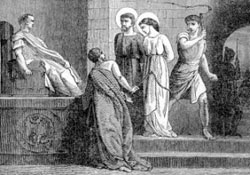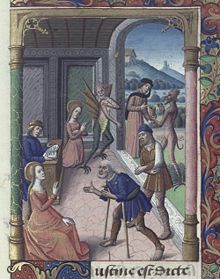
Feastday: September 26
Death: 304
According to the fictional morality story that had great popularity though with no basis in fact, Cyprian was a native of Antioch who became a practitioner of sorcery and black magic. He traveled widely in Greece, Egypt, Macedonia, and the Indies to broaden his knowledge of the black arts. When Aglaides, a young pagan, fell in love with the beautiful Justina, a Christian of Antioch, he asked Cyprian to help him win her. Cyprian tried all his black magic and diabolical expertise to win her for himself but was repelled by her faith and the aid of Mary. He called on the devil, who assailed Justina with every weapon in his arsenal, to no avail. When Cyprian realized the overwhelming power of the forces arrayed against him and the devil, Cyprian threatened to leave the devil's service; whereupon the devil turned on Cyprian, only to be repulsed by the sign of the cross made by a repentant Cyprian, who realized the sinfulness of his past life. He then turned to a priest named Eusebius for instruction and was converted to Christianity. He destroyed his magical books, gave his wealth to the poor, and was baptized, as was Aglaides. Justina then gave away her possessions and dedicated herself to God. In time Cyprian was ordained and later was elected bishop of Antioch. He was arrested during Diocletian's persecution of the Christians and tortured at Tyre by the governor of Phoenicia, as was Justina. They were then sent to Diocletian, who had them beheaded at Nicomedia. Feast day is September 26th.
We ask you, humbly: don't scroll away.
Hi readers, it seems you use Catholic Online a lot; that's great! It's a little awkward to ask, but we need your help. If you have already donated, we sincerely thank you. We're not salespeople, but we depend on donations averaging $14.76 and fewer than 1% of readers give. If you donate just $5.00, the price of your coffee, Catholic Online School could keep thriving. Thank you.Help Now >
Saints Cyprian and Justina are honored in the Catholic Church, Eastern Orthodox Church and Oriental Orthodoxy as Christians of Antioch, who in 304, during the persecution of Diocletian, suffered martyrdom at Nicomedia (modern-day İzmit, Turkey) on September 26. According to Roman Catholic sources, no Bishop of Antioch bore the name of Cyprian.
Origin
The story must have arisen as early as the 4th century, as it is mentioned by both St. Gregory Nazianzen and Prudentius; both, nevertheless, have conflated Cyprian with St. Cyprian of Carthage, a mistake often repeated. The attempt has been made to find in Cyprian a mystical prototype of the Faustian legend. The legend is given in Greek and Latin in Acta SS. September, VII. Ancient Syriac and Ethiopic versions of it have been published. Their story is told in the Golden Legend.
The outline of the legend or allegory is found with diffuse descriptions and dialogues in the unreliable "Symeon Metaphrastes" and was made the subject of a poem by Empress Aelia Eudocia.
Legend
Cyprian, known by the title of "the magician", to distinguish him from Cyprian, bishop of Carthage, received a liberal education in his youth, and particularly applied himself to astrology; after which he traveled for improvement through Greece, Egypt, India, etc. Cyprian was a magician in Antioch and dealt in sorcery.
Justina of Antioch is a Christian saint, known for converting Cyprian, a pagan magician of Antioch. Justina was said to have been a young woman who took private vows of chastity and was killed during the persecutions of the Roman emperor Diocletian. She is said to have been martyred in the year 304 AD.
A would-be suitor sought a magic spell from Cyprian to induce Justina to marry him. The charms had no effect on Justina, who spent her time in prayer and fasting. Brought to despair, Cyprian made the sign of the cross himself and in this way was freed from the toils of Satan. He was received into the Church, was made pre-eminent by miraculous gifts, and became in succession deacon, priest and, finally, bishop, while Justina became the abbess of a convent.
During the Diocletian persecution, both were seized and taken to Damascus, where they were tortured. As their faith never wavered, they were brought before Diocletian at Nicomedia, where at his command they were beheaded on the bank of the river Gallus. The same fate befell a man named Theoctistus, who observing Cyprian's faith, declared himself a Christian. After the bodies of the saints had lain unburied for six days, they were taken by Christian sailors to Rome, where they were interred on the estate of a noble lady named Rufina and later were entombed in Constantine's basilica.
Justina is mentioned in Foxe's Book of Martyrs. It was under the 10th Persecution in 303 AD while Diocletian was Emperor of Rome. It says:
" In the course of time he [Cyprian] became acquainted with Justina, a young lady of Antioch, whose birth, beauty, and accomplishments, rendered her the admiration of all who knew her. A pagan gentleman applied to Cyprian, to promote his suit with the beautiful Justina; this he undertook, but soon himself converted, burnt his books of astrology and magic, received baptism, and felt animated with a powerful spirit of grace. The conversion of Cyprian had a great effect on the pagan gentleman who paid his addresses to Justina, and he in a short time embraced Christianity. During the persecutions of Diocletian, Cyprian and Justina were seized upon as Christians, the former was torn with pincers, and the latter chastised; and, after suffering other torments, both were beheaded."
 Saint Cyprian and the demon, 14th-century manuscript of the Golden Legend.
Saint Cyprian and the demon, 14th-century manuscript of the Golden Legend.
Veneration and liturgical celebration
Their feast day appeared in the calendar of Roman Rite celebrations from the thirteenth century until 1969, when it was removed because of the lack of historical evidence of their existence. Their names were also removed from the subsequent (2001) revision of the Roman Martyrology, the official but professedly incomplete list of saints recognized by the Roman Catholic Church. The Roman Martyrology, however, includes five saints called Cyprian and two named Justina. Some traditionalist Catholics continue to observe pre-1970 versions of the Roman Calendar.
In popular culture
The Spanish author, Pedro Calderón de la Barca, took the story as the basis of a drama: El mágico prodigioso. In 2005, American author Tono Rondone published a novel, The Martyrs, which is a continuation of this tradition.
The Great Book of Saint Cyprian is full of prayers and spells, and is widely sold in the Portuguese- and Spanish-speaking world.
Cyprianus is a popular name for a grimoire in Scandinavian folklore.





